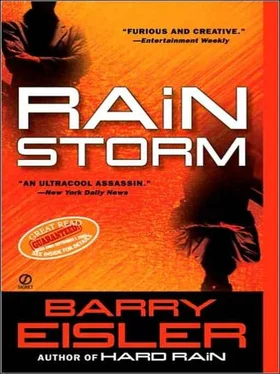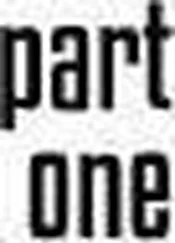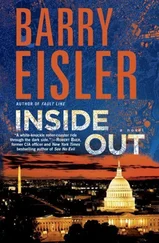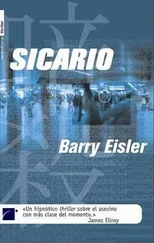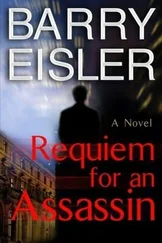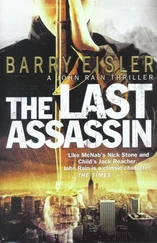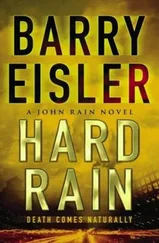Yeah, I could see that sequence. See it clearly.
Damn, this guy was real trouble. I was beginning to wake up to the magnitude of the problem I faced.
“Belghazi’s connection to the yakuza ,” I said. “Is it close enough for them to help him with a problem elsewhere in Asia, if he asks?”
Tatsu nodded. “I would say so.”
Shit.
I realized I was going to have to take Belghazi out. Not just for the money, but simply to survive. And then I realized, He knows that. He’s putting himself in your shoes, too. Which sharpens his imperative: to eliminate you.
A vicious cycle, then. And winner take all.
All right. I needed to end this, and end it fast. I wanted this guy planted in the ground and no longer giving orders. “Natural causes,” if possible; unnatural, if not.
“How can I help?” Tatsu asked.
I thought for a moment, then said, “You can get me the particulars for my new friend.”
“Your new friend?”
I nodded. “Charles Crawley.”
DELILAH HAD SAID Belghazi was off Macau for a day or two, and there wasn’t much I could do for the moment with her in the way, anyway. I decided that my own brief departure would be a small enough risk to justify certain possible out-of-town gains.
I took the bullet train from Tokyo Station to Osaka, a less likely international departure point than Tokyo’s Narita. I checked the bulletin board from an Internet kiosk. The information I had asked Tatsu for was waiting for me: Charles Crawley III. Home, work, and cell phone numbers; work address, supposedly the State Department but in fact CIA headquarters in Langley and therefore unlikely to be operationally useful; and home address: 2251 Pimmit Drive, West Falls Church. Unit #811. Suburban Virginia. Most likely an apartment complex, one with at least eight floors.
I booked a nonstop ANA flight to Washington Dulles for the next morning. Then I checked into a cheap hotel in Umeda for the night. I lay in bed, but sleep wouldn’t come. Too much coffee. Too much to think about.
I got up, slipped into the yukata robe that even the lowest budget Japanese hotels can be counted on to provide, and sat in the cramped room’s single chair. I left the lights off and waited to get tired enough to fall asleep. I could tell it would be a while.
The cheap rooms are always the hardest. A little luxury can numb like anesthetic. Take the anesthetic away, and pain rushes into its absence like frigid water through a punctured hull. I felt memories beginning to crowd forward, agitated, insistent, like ghosts newly emboldened by the dark around me.
I was eight the first time I saw my mother cry. She was a strong woman-she had to be, to give up her life and career in America to become my father’s wife-and, until the moment I learned otherwise, I had assumed that she was incapable of tears.
One day, Mrs. Suzuki, our neighbor, came and picked me up in the middle of the afternoon at school, telling me only that I was needed at home. It was June and the air on the train ride back was close and hot and sticky. I looked out the window during the trip, wondering vaguely what was going on but confident that all was well and everything would be explained to me shortly.
My mother was waiting at the door of our tiny Tokyo apartment. She thanked Mrs. Suzuki, who held an extra low bow for a long moment before silently departing. Then my mother closed the door and walked me to the upholstered couch in the living room. Her manner was possessed of a ceremony, a gravity that I found odd and somehow ominous. She took my small hands in her larger ones and looked into my eyes. Hers seemed strange-weak and somehow frightened-and I glanced around, uncomfortable, afraid to look back.
“Jun,” she said, her voice unnaturally low, “I have bad news and I need you to be very brave, as brave as you can.” I nodded quickly to show her that of course she could always count on my bravery, but I sensed as children do that something was terribly wrong and my fear began to unfold, to spread out inside me.
“There’s been an accident,” she said, “and Papa… Papa has died. Nakunatta no .” He’s gone.
I wasn’t completely unfamiliar with the concept of death. My paternal grandparents had a dog that had died when I was four, and my mother had explained to me at the time that Hanzu , Hans, had been very old and had gone to Heaven. But the concept that my father could be gone, gone , was too enormous for me to grasp. I shook my head, not really understanding, and it was then that my mother’s composure buckled and her tears came flooding through.
And so that afternoon I made my first real acquaintance with death, as the thing that could make my strong mother cry.
I cried with her then, terrible tears of hurt and fear and confusion. And over the weeks and months that followed, as the lack of my father, previously such a commanding figure in my life, began to take root, my acquaintance with death deepened. I came to conceive of it as the wild card in a previously ordered universe, the sudden disrupter, the leering, lurking thief.
It took about five more years for me to complete my understanding that there was no more Papa, that he was represented now only by increasingly remote memories, like a series of crude cave paintings left behind by some long-vanished people. Now death was a place, a place to which people disappeared forever when they died, a place that gradually sucked away the clarity of memory afterward for a similar one-way journey.
At nineteen, I received the military telegram informing me that my mother had gone to that place, as well. Losing her was easier. I was older, for one thing. And at that point I had seen, indeed I had delivered, a great deal of death, as a soldier in Vietnam. Most important, perhaps, I was familiar with the process, the outcome of loss. Grief held no more mystery for me than did the bleeding, stanching, and eventual healing that accompany the infliction of a survivable bodily wound.
But familiarity diminishes only fear. It does considerably less for pain.
Midori isn’t dead. Only gone. Maybe that’s why I find myself thinking of her, more often than I should. I picture her face, and remember the sound of her voice, the touch of her hands, the feel of her body. I have no such power of recall for scent, but know I would recognize hers in an instant and wish that I could breathe it in even once more before I die. I miss her conversation. We talked about things I’ve never talked about with anyone. I miss the way she would kiss me, gently, on the forehead, the lids of my eyes, again and again after we had made love.
I still say her name, my sad little mantra. I find in those incanted syllables all that I can tangibly conjure of her, and that sometimes the conjuring contents me, however briefly. Even if I can’t talk with her, I can at least talk to her. Something like that. Some consolation like that.
No, Midori isn’t dead, but I deal with her memory by approaching my feelings as those of grief. My world is paler and poorer by her absence, but isn’t this the case whenever we lose a loved one? I knew even as a teenager that my life would have been richer had my father survived my boyhood. I learned to accept this fact as immutable and, in the end, as perhaps not all that relevant. Midori wasn’t dead, but she was an impossibility, and, for the imperatives of my grief, what was the real difference?
I rubbed my hands over my eyes, wishing for sleep, for sleep’s temporary oblivion. It wouldn’t come. I would have to wait some more.
I sit in the dark of these empty rooms, and sometimes I think I can feel the presence of all the others who have done the same before me. Certainly the marks are there. The depression in the mattress, the line worn in the carpet between the bathroom and the door. Or the stains of sweat or saliva on the pillow, if you look beneath the case; or maybe of semen, of tears; sometimes of something darker, something like blood. I sit, the dark around me close but also boundless, and as my imagination slips into the vastness of that featureless bourn, I realize these marks are signs, artifacts of lives and moments that were but are no longer, like ashes in an empty hearth, or bones cast aside from some long ago supper, or a tattered shape that might have been a scarecrow in a field grown over with weeds. All just physical graffiti, unintentionally scrawled by other solitary travelers, detritus deposited by random men on their way to that common destination, and not just the marks of someone else’s passage, but portents of my own.
Читать дальше
